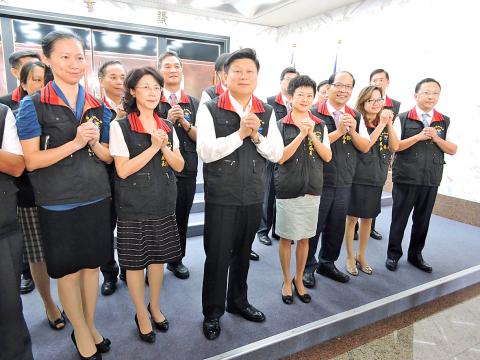A poll on the performances of local government leaders released by Chinese-language magazine Global Views Monthly yesterday showed that Hualien County Commissioner Fu Kun-chi (傅崑萁), an independent, set a record by gaining a five-star rating for five consecutive years.
Twenty-one county and city heads were included in the poll, with 12 individuals surpassing their scores from last year, including Greater Kaohsiung Mayor Chen Chu (陳菊) of the Democratic Progressive Party (DPP), Taitung County Commissioner Justine Huang (黃健廷) of the Chinese Nationalist Party (KMT), Chiayi Mayor Huang Min-hui (黃敏惠) of the KMT and New Taipei City Mayor Eric Chu (朱立倫) of the KMT, the poll showed.
As Nantou County had an acting commissioner due to Nantou County Commissioner Lee Chao-ching (李朝卿) being suspended over alleged involvement in a criminal case, its results were not included in the overall rankings.

Photo: CNA
According to the latest poll, local government heads who gained a five-star rating were Greater Tainan Mayor William Lai (賴清德) of the DPP, Chen, Yilan County Commisioner Lin Tsung-hsien (林聰賢) of the DPP, Fu and Huang.
The rankings for the five special municipalities were the same as last year, with Lai having a five-star rating for three consecutive years, Chen for two years, Chu receiving 4.5 stars, Taipei City Mayor Hau Lung-bin (郝龍斌) of the KMT having a four-star rating for three year in succession and Greater Taichung Mayor Jason Hu (胡志強) of the KMT receiving 3.5 stars, up from three stars last year.
Miaoli County Commissioner Liu Cheng-hung (劉政鴻) of the KMT, who received five stars over the past four years due to his efforts to promote education, tourism and corporate investment, was downgraded to 3.5 stars due to last year’s Dapu incident, the magazine said.
The Dapu incident refers to the Miaoli County Government seizing farmland to expand the Jhunan science park by blocking off roads and sending excavators into farms that were awaiting harvest in 2010 and the forced demolition of four family houses in Dapu Borough (大埔) last year.
The poll was conducted from March 13 to April 20, with interviews conducted with 14,349 people, Global Views Monthly said.
The margin of error on Taiwan proper was 3.7 percentage points, while Penghu and Kinmen counties had a margin of error of 4.9 percentage points and Lienchiang County had a margin of error of 6.9 percentage points.
Separately yesterday, National Taiwan University economics professor Lin Chieng-fu (林建甫), who attended a press conference hosted by the Taiwan Competitiveness Forum on the economic performance of the country’s five main cities, said that the poll’s rating of Hu as third from bottom in public approval rating was “inexplicable.”
Approval ratings are not necessarily an indicator of a politician’s performance during his or her term, Lin Chieng-fu said.
Lin Chieng-fu and other academics at the meeting also claimed that Hu’s low approval rating might be attributed to his exceptionally long term in office (possible because of the 2010 merger of Taichung City and Taichung County).
“The residents might be tired of seeing him, but that does not mean he is not doing well,” said forum chief executive Hsieh Ming-hui (謝明輝), who likened the poll result to a man being tired of a woman’s beauty if he sees her every day.
The Taiwan Competitiveness Forum, a think tank known for its pro-unification stance, yesterday said it endorsed Hu in the year-end mayoral election.
Additional reporting by Alison Hsiao

Taiwanese can file complaints with the Tourism Administration to report travel agencies if their activities caused termination of a person’s citizenship, Mainland Affairs Council Minister Chiu Chui-cheng (邱垂正) said yesterday, after a podcaster highlighted a case in which a person’s citizenship was canceled for receiving a single-use Chinese passport to enter Russia. The council is aware of incidents in which people who signed up through Chinese travel agencies for tours of Russia were told they could obtain Russian visas and fast-track border clearance, Chiu told reporters on the sidelines of an event in Taipei. However, the travel agencies actually applied

Japanese footwear brand Onitsuka Tiger today issued a public apology and said it has suspended an employee amid allegations that the staff member discriminated against a Vietnamese customer at its Taipei 101 store. Posting on the social media platform Threads yesterday, a user said that an employee at the store said that “those shoes are very expensive” when her friend, who is a migrant worker from Vietnam, asked for assistance. The employee then ignored her until she asked again, to which she replied: "We don't have a size 37." The post had amassed nearly 26,000 likes and 916 comments as of this

New measures aimed at making Taiwan more attractive to foreign professionals came into effect this month, the National Development Council said yesterday. Among the changes, international students at Taiwanese universities would be able to work in Taiwan without a work permit in the two years after they graduate, explainer materials provided by the council said. In addition, foreign nationals who graduated from one of the world’s top 200 universities within the past five years can also apply for a two-year open work permit. Previously, those graduates would have needed to apply for a work permit using point-based criteria or have a Taiwanese company

The Shilin District Prosecutors’ Office yesterday indicted two Taiwanese and issued a wanted notice for Pete Liu (劉作虎), founder of Shenzhen-based smartphone manufacturer OnePlus Technology Co (萬普拉斯科技), for allegedly contravening the Act Governing Relations Between the People of the Taiwan Area and the Mainland Area (臺灣地區與大陸地區人民關係條例) by poaching 70 engineers in Taiwan. Liu allegedly traveled to Taiwan at the end of 2014 and met with a Taiwanese man surnamed Lin (林) to discuss establishing a mobile software research and development (R&D) team in Taiwan, prosecutors said. Without approval from the government, Lin, following Liu’s instructions, recruited more than 70 software